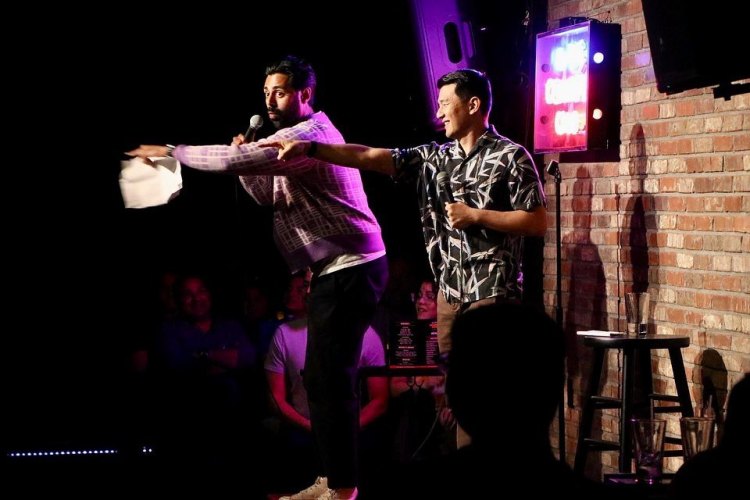
“Patriot Act” Comedian Hasan Minhaj Provokes Masses With This?
Earlier in September, the New Yorker published an exposé on comedian Hasan Minhaj revealing that much of the experiences he shares in his stand-up acts are fabricated.

The comedian Hasan Minhaj has made a name for himself in the comedy scene in the past decade, from “Patriot Act” being an award-winning Netflix series to him being included in Time magazine’s list of most influential people in 2019 to interviewing Barack Obama this past year. The exposé by Clare Malone raises eyebrows about Hasan Minhaj’s legitimacy in his stage work and leaves us to question the relationship between comedy, truth, and identity.
Where should exaggeration of the truth for the sake of comedy stop?
In the New Yorker piece, Malone provides examples of Hasan Minhaj fabricating the anecdotes shared in his Netflix series and specials. It seems that the stories he specifically touched on were the Islamophobic experiences that Minhaj claimed to have faced growing up. Much of the allure and relatability of Hasan Minhaj’s stand-up routines come from the way he’s able to share the experiences he’s endured because of his identity through a comedic social justice lens.
He became a figure in mainstream media to look up to, especially for those who identify as Muslim and South Asian. That is why learning about the fact that much of his autobiographical storytelling hinges on the exaggerations of—in his words—“emotional truths” can be a bit disappointing.
Although Hasan Minhaj’s admission to fabricating his real-life experiences for his stand-up acts is frown-worthy because of the real people that are involved and what this means for representation, there were a few who came to his defense. Many comedians would agree that a little bit of fiction is welcomed in the comedy scene and that exaggeration is a tactic of storytelling. Embellishing events can be a part of the nature of being a comic—taking a small moment and stretching it out to see how far it can go and how many laughs it can acquire; but it becomes a complex issue when it seems to serve political purposes and affects a larger community at hand.
How does this impact Muslim narratives in media?
The representation Hasan Minhaj provides with his platform as a Muslim Indian-American comedian is essential. Prior to this debacle, he was the front-runner to take over as the next host of “The Daily Show,” which—if it were to happen—would have made Minhaj the first Muslim late-night host of a show of this caliber. He has made strides in the entertainment industry and has been an icon as a Muslim man growing up in a post-9/11 society where many Muslims have faced the harrowing experiences Minhaj has told about in his stand-up comedy.
This version of the Muslim narrative is prevalent in mainstream media and is part of the reason why Hasan Minhaj’s platform grew. This made Hasan Minhaj’s stories relatable to his Muslim audience in a way that made the post-9/11 Muslim experience visible and valid.
As active consumers of media, we must be willing to provide our beloved figures of the entertainment industry with the space to make mistakes and grow from them.
As Muslims, we are constantly under attack for our identity. So when individuals at the level of fame as Hasan Minhaj lose a sense of legitimacy, unfortunately, our credibility as a community also goes under fire. We always have to fight to be seen as “American enough” and we want to be trusted and represented in the media to defy the negative stereotypes that are constantly circulating about us.
When things like this happen, it feels like a step back. It feels like a loss for our community. If our credibility is under fire, how can we expect Muslim narratives to be taken seriously?
I want to say that as someone who has watched “Patriot Act” and “The King’s Jester,” I understand the appeal of Hasan Minhaj and love that someone who shares a similar identity to me is in the limelight. Given his recent run-in with fabricating stories and last year’s allegations of cultivating a hostile work environment, things aren’t looking great for the comedian right now. I do think it’s important to consider that representation always comes with a cost.
When we hold individuals we identify with on a pedestal, we’re setting them up for failure and disappointment. As active consumers of media, we must be willing to provide our beloved figures of the entertainment industry with the space to make mistakes and grow from them.
I think it’s a possibility for Hasan Minhaj to make his own comeback, and I hope that this situation helps to shift the way we view Muslim representation and how we engage with his comedic work.
Do you think Hasan Minhaj can recover from this and return to having a platform worth supporting? Slide into our socials @muslimgirl and let us know!




1 Comment
Hi there to all, for the reason that I am genuinely keen of reading this website’s post to be updated on a regular basis. It carries pleasant stuff.